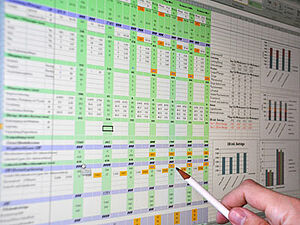
Policies and innovations that are oriented along efficiency, consistency and sufficiency principles are essential to achieve a transition towards more sustainable and resilient agri-food systems. Such policies and innovations need to address key challenges of organic and other integrated agri-food systems, ranging from sustainable land use to food security.
Our research includes topics such as further developing payment systems for ecosystem service delivery, assessing the relative benefits of precision agriculture, or determining the impact of innovations on farmers’ livelihoods in the tropics. We also focus on developing transparent and innovative certification methods for organic and other certified production through a range of governance aspects within value chains.
Detailed analysis of existing and innovative farm system approaches allows us to identify resilient production practices that contribute to economically and ecologically sound solutions in both developed and developing countries. An interdisciplinary approach, using state of the art assessment methods and indicators, supports an analysis beyond direct measures such as yield, into complex issues such as resource scarcity and ecosystem carrying capacities. This is crucial to identify economically viable and ecologically appropriate systems within local or global scales.
Our toolbox reaches from plot and farm based analysis to the sector level and entire food system, using impact evaluation methods, integrated farm models (incl. lifecycle assessment) or mass-flow models (especially the global food system model SOLm). These are used in combination to enable us e.g. to compare the relative performance of farm systems (e.g. organic farming, conventional farming, agroecology, low-input farming or agroforestry), to study the uptake of innovations and the effects of policy interventions and to contribute to society’s grand challenges, such as how can we sustainably feed the world in 2050. Therefore, through a combination of ex-post and ex-ante policy analysis, the effectiveness of existing and alternative policies and innovations can be systematically assessed, informing the development of better targeted interventions.
Contact
Projects
Team
| Group Agri-Food Systems | ||
| Augustiny Eva | Food system modelling, impact assessment | +41 (0)62 865-1743 |
| de Baan Laura | Environmental modelling, life cycle assessment | +41 (0)62 865-6387 |
| De Luca Kevin | Food system modelling, sustainability assessment | +41 (0)62 510-5323 |
| Frehner Anita | Deputy Head of the Department of Food System SciencesSustainable and healthy nutrition, sustainability assessment, food system modelling | +41 (0)62 865-0466 |
| Gerwien Laura | Social dimensions of circular food systems, modelling of food systems | +41 (0)62 865-1721 |
| Hediger Florian | Data science, data management | +41 (0)62 865-6370 |
| Heidenreich Anja | Spatial environmental modelling, ecosystem services, food system modelling, sustainability assessment | +41 (0)62 865-0486 |
| Müller Adrian | Food system modelling, climate policy, climate change mitigation, climate change adaptation, sufficiency | +41 (0)62 865-7252 |
| Oggiano Philipp | Life Cycle Assessment, environmental modelling | +41 (0)62 865-1727 |
| Pfeifer Catherine | Leader of the Group Agri-Food Systemsimpact assessment of livestock production systems, spatial environmental modeling, transdisciplinary processes | +41 (0)62 865-6380 |
| Reinecke Sabine | Policy and governance analysis, knowledge communication and policy advice, forestry-agriculture-climate | +41 (0)62 865-0415 |
| Schütz de Rivera Laura | Social dimensions of circular food systems, participatory research, co-creation | +41 (0)62 865-1718 |
| Winterberg Ramon | Environmental modelling, livestock production systems | +41 (0)62 510-5329 |
| Zarrineh Nina | Climate change impact assessments (mitigation and adaptation), modelling of hydrology, water quality, land use and food systems, agroecology | +41 (0)62 865-1753 |



